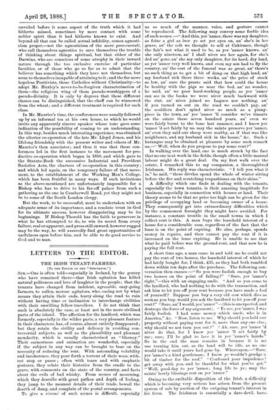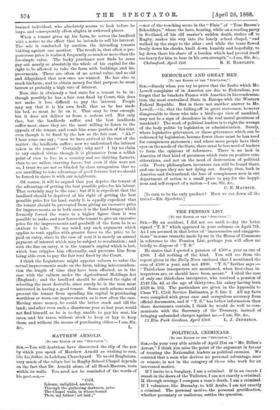LETTERS TO THE EDITOR.
THE IRISH TENANT-FARMERS.
[TO THE EDITOR or THE "SPECTATOR."] Sts.,—One is often told—especially in Ireland, by the gentry who have remained there—that Irish agitation has killed natural politeness and love of laughter in the people ; that the tenants have changed from indolent, agreeable, easy-going farmers, to sullen, morose agitators, who, caring not by what means they attain their ends, hurry along the road to ruin without having time or inclination to interchange civilities with their unwilling fellow-travellers. I do not think that such is absolutely the case, at least not in the more civilised parts of the island. The affection for the landlord, which was formerly, especially in the wilder parts, a very pleasant feature in their characters, has, of course, almost entirely disappeared ; but they retain the civility and delicacy in avoiding con- troversial subjects, as well as the plausibility and pleasant mendacity, which is usually characterised as "blarney." Their earnestness and animation are wonderful, especially if the subject in any way can be brought to bear on the necessity of reducing the rent. With astounding volubility and incoherence, they pour forth a torrent of their woes, with- out stop or pause ; often with tears and with emphatic gestures, they relate their histories from the cradle to the grave, with comments on the state of the country, and facts about the evils of bad whisky. From scenes of mourning, which they describe with great pathos and depth of feeling, they jump to the meanest details of their trade, bewail the dearth of dung, and complain of the postal arrangements.
To give a resume of such scenes is difficult, especially as so much of the manner, voice, and gesture cannot be reproduced. The following may convey some feeble idea
of such scenes :—" And thin, yer 'anner, there was my daughter, as foine a girl as iver ye set yer eyes on, an' she's in her grave, an' the colt we thought to sell at Cakirmee, though the fair's not what it used to be, as yer 'anner knows, an' she only nineteen, an' I shall niver see her again, for she's ded an' gone, an' she my only daughter, for its hard, dry land,
as yer 'anner very well knows, and even my son had to fly the country, an' the cost of the funeral was so great, an' there's no such thing as to get a bit of dung on that high land, an' my husband sick there three weeks, an' the price of stock so low, an' sure the waste said that how could the house be healthy with the pigs so near the bed, an' no wonder, he said, an' we poor hard-working people, as yer 'anner can see in the books we were niver much backward with the rint, an' niver joined no Lagues nor nothing, an' if you turned us out on the road we couldn't pay, an' the souldiers don't aphid niver so much as a pinny. piece in the town, an' yer 'anner 'll consider we're tinants on the estate these seven hundred years, an' even we were fairly burnt to the bone last summer, and I know yer 'anner 'd act fairly by us, may the saints preserve yer 'anner, an' even they said our sheep were scabby, as if that was like neighbours, and my husband sick in the house," &c. Such a harangue may be obtained at pleasure by some such remark as,—" Well, when do you propose to pay some rent ?"
In walking over the land, one is much struck by the fact that no one is at work in the fields, though often a little manual labour might do a great deal. On my first walk over the estate, I remarked this to my companion, a thoroughbred Irishman. His reply was characteristic. "I tell you what it is," he said, "these divvles spend the whole of winter sitting before the fire and scratching trapashiums on their shins."
A difficulty which one finds in dealing with the tenants, especially the town tenants, is their amazing inaptitude for business, especially in connection with houses or land. Their theory seems to be that no price too high can be given for the privilege of occupying land or becoming owner of a house. They consequently get into extraordinary difficulties which by the commonest foresight they might have avoided. For instance, a constant trouble in the small towns in which I collect rent is this. A man buys the leasehold interest of a house for a considerable sum, regardless of the fact that the lease is on the point of expiring. He also, perhaps, spends money in repairs, and then cannot pay the rent if it is increased on the lease expiring. He is unable to see that what he paid before was the ground-rent, and that now he is paying the full rent.
A short time ago, a man came in and told me he could not pay the rent of two houses, the leasehold interest of which he had lately bought for, I think, 235, as they had both tumbled down within ten days after the purchase. The following con- versation then ensues :—" So you were foolish enough to buy two houses on the point of falling ?" "Sure, yer 'anner's right,"—this with an engaging smile. "And so you come to the landlord, who had nothing to do with the transaction, and ask him to let you off your rent because you have made a fool of yourself? Suppose you buy a very old cow which dies as soon as you buy, would you ask the landlord to let you off your rent?" "Sure, an' I would, yer 'anner"—(this is unexpected, and destroys the force of my argument). "Ye see, yer 'anner, I was fairly foolish. I had some money which uncle, who is in America," &e. "Now, listen to me. Why should you hold our property without paying rent for it, more than any one else ; why should we not turn you out ?" " Ah, sure, yer 'anner 'd niver do that, for I know yer 'anner '11 act fairly by me ; sure, I'll be glad to lave it in yer 'anner's hands." So in the end the man remains in because it is no use turning him out, as the land will be idle, as no one would take it until years had gone by. Whereupon,—" Sure, yer 'anner's a kind gentleman ; I know ye wouldn't grudge a bit of timber for the roof." "Confound your impudence ! get away with you, and be thankful for what you've got." "Well, good-day to yer 'anner ; long life to ye ; may the saints' howly blissings rest on yer 'anner."
Owing to the excitable disposition of the Irish, a difficulty which is becoming very serious has arisen from the present system of sale by auction of the outgoing tenant's interest in his farm. The Irishman is essentially a dare-devil, hare.
brained individual, who absolutely scorns to look before he leaps, and consequently often alights in awkward places.
When a tenant gives up his farm, he serves the landlord with a notice to the effect that he intends to sell his interest. The sale is conducted by auction, the intending tenants bidding against one another. The result is, that often a pre- posterous price is realised, frequently as much or more than the fee-simple value. The lucky purchaser now finds he must pay out nearly or absolutely the whole of his capital for the right to be allowed to take the farm with buildings and im- provements. These are often of no actual value, and so old and dilapidated that new ones are wanted. He has also to stock his farm ; and to obtain money for that purpose, he must borrow at probably a high rate of interest.
Now, this is obviously a bad state for a tenant to be in : though possibly he has a fair rent fixed by Court, this does not make it less difficult to pay the interest. People may say that it is his own fault, that as he has made his bed, so must he lie on it. That may be true enough, but it does not deliver us from a serious evil. Not only that, but the landlords suffer, and the best landlords gaffer most, since they are the most willing to listen to the appeals of the tenant, and remit him some portion of his rent, even though it be fixed by the law as the fair rent. " Ah !" I hear some one say ; "now we have arrived at the root of the matter : the landlords suffer ; now we understand the interest taken in the tenant." Certainly; why not? I lay no claim to any exalted virtue, though it is pleasanter from a selfish point of view to live in a country and see thriving farmers, than to see sullen, starving faces ; but even if this were not so, I trust we are not so blinded by class antagonism that we are unwilling to take advantage of good fortune lest we should be forced to share it with our neighbours.
Of course, it will be argued that you deprive the tenant of the advantage of getting the best possible price for his labour. That certainly may be the ease; but if it is expedient that the landlord should be deprived of his right of getting the best possible price for his land, surely it is equally expedient that the tenant should be prevented from giving an excessive price for improvements, as in both cases it is the land-hunger which formerly forced the rents to a higher figure than it was possible to make, and now forces the tenant to give an excessive price for the improvements and goodwill of the farm he is so anxious to take. To my mind, any such argument which applies to rent, applies with greater force to the price to be paid on entry, since in the case of rent it is merely an annual payment of interest which may be subject to revaluation ; and with the fine on entry, it is the tenant's capital which is lost, which loss cripples him effectually, and prevents him from being able even to pay the fair rent fixed by the Court.
I think the Legislature might appoint valuers to value the actual improvements made on the farm, taking into considera- tion the length of time they have been effected, as is the ease with the valuers under the Agricultural Holdings Act (England) ; and the landlord should be allowed the right of selecting the most desirable, since surely he is the man most interested in having a good tenant. Some such scheme would prevent the tenant from spending his capital in purchasing worthless or worn-out improvements, as is now often the case. Having more money, he could the better stock and till the land; and after even such a disastrous year as last year, would not find himself, as he is to-day, unable to pay his rent, his rates, and his taxes, without stock to keep or hay to keep them, and without the means of purchasing either.—I am, Sir, L.



































 Previous page
Previous page